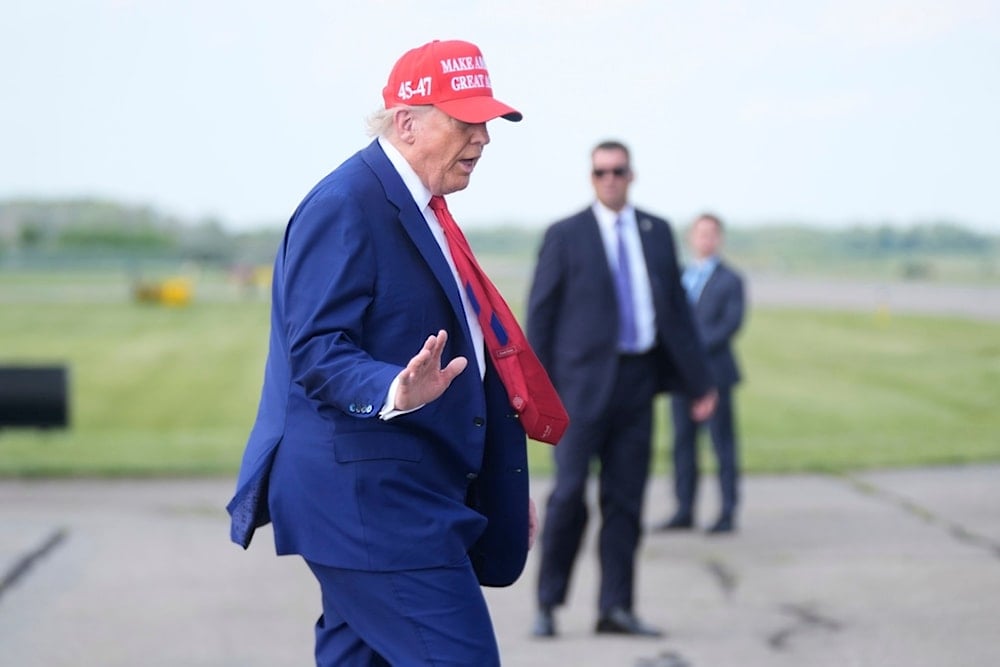Trump's Iran strike 'stupidest decision' ever, could spark WW3: Expert
Retired US Army Lt. Col. Earl Rasmussen has condemned President Trump's airstrikes on Iranian nuclear sites as reckless, illegal, and potentially catastrophic, warning they were based on false intelligence, driven by Israeli pressure, and could spark a global conflict.
-

President Donald Trump boards Air Force One at Morristown Municipal Airport in Morristown, N.J., Saturday, June 21, 2025 (AP Photo/Manuel Balce Ceneta)
A former US military officer and prominent foreign policy expert has issued a scathing rebuke of President Donald Trump's recent decision to authorize airstrikes on Iranian nuclear facilities, calling it "perhaps the most stupid decision of any President."
Earl Rasmussen, a retired US Army lieutenant colonel and former vice president of the Washington-based Eurasia Center, told Russia's RIA Novosti that the attacks, carried out Sunday on Iran's nuclear sites in Natanz, Fordow, and Isfahan, were reckless, illegal, and based on flawed intelligence. "The decision to support Israel was bad enough, but the decision to directly become involved, at the request of Israeli Prime Minister Benjamin Netanyahu, and bombing Iran, is perhaps the most stupid decision of any President," Rasmussen said.
He argued the situation mirrored, if not exceeded in folly, the US invasion of Iraq in 2003. "These attacks look even more stupid," he said, adding that Trump had ignored the unanimous assessment of the US Intelligence Community, which had found no evidence that Iran was developing a nuclear weapon. "Very poorly done and directly undercutting the Director of National Intelligence," Rasmussen noted.
A Risk of Global War?
Rasmussen warned that this act of aggression, reportedly greenlit behind closed doors while Trump was attending a private event at his New Jersey golf club, could lead to devastating consequences.
"Due to the close relationships of Iran with China and Russia, and the fact that the bombing of Iran was based on false information, illegal and violated nearly every international agreement… this major misstep and stupid bravado action of the US, along with the unprovoked and illegal initiation of the conflict from Israel, could become a major disaster for the world and very possibly escalate to be the seeds of World War III," he warned.
His comments align with rising global alarm over the US operation. UN Secretary-General António Guterres described the attacks as "a serious escalation" and cautioned against the risk they pose to international stability. Moscow issued a sharp condemnation as well. Russian President Vladimir Putin, in a meeting with Iranian Foreign Minister Abbas Araghchi, described the attacks as "unprovoked aggression" with "absolutely no justification."
Read more: Putin to Araghchi: Unprovoked aggression on Iran baseless, unjustified
Dubious Intelligence, Questionable Motives
CNN reporting has further exposed the behind-the-scenes decisions leading up to the strike, dubbed Operation Midnight Hammer. According to the report, Trump had already approved the bombing days before the operation, while still publicly claiming diplomacy remained an option. The attacks were carried out by B-2 bombers and US Navy submarines, with strategic decoys deployed to mislead Iranian radar systems. Despite the magnitude of the operation, described as one of the most complex in US military history, no engagement occurred between Iranian forces and US aircraft, raising further questions about Iran's alleged threat level.
Rasmussen's concerns are reinforced by recent assessments from the International Atomic Energy Agency (IAEA) and US intelligence officials. IAEA Director General Rafael Grossi confirmed that no evidence of a nuclear weapons program has been found in Iran. Similarly, the CNN report cited US intelligence sources stating Iran was not actively pursuing nuclear arms at the time of the attacks.
Human rights advocate and former British ambassador Craig Murray added that Iran has acted with "extraordinary responsibility and patience" despite persistent Israeli provocations and repeated violations of its sovereignty.
Iran and Allies Push Back
In Tehran, backlash against the attacks continues to build. Iranian Foreign Ministry spokesperson Esmaeil Baghaei condemned the attacks as a an "act of blatant aggression," while Parliament Speaker Mohammad Baqer Qalibaf signaled Iran's intention to suspend cooperation with the IAEA, accusing the agency of political bias.
Foreign Minister Araghchi, during his visit to Moscow, reaffirmed Tehran's commitment to peaceful nuclear development and described Russia as being "on the right side of history and international law." The Kremlin, for its part, reiterated its support for Iran and floated a proposal to store Iranian enriched uranium on Russian soil as part of a wider stabilization initiative.
Meanwhile, President Trump has shown no signs of backing down. In a late-night address, he declared: "Iran, the bully of the Middle East, must now make peace. If they do not, future attacks will be far greater and a lot easier."
As global outrage builds and diplomatic efforts intensify, Rasmussen's words hang heavily: "This could become a major disaster for the world."

 5 Min Read
5 Min Read










